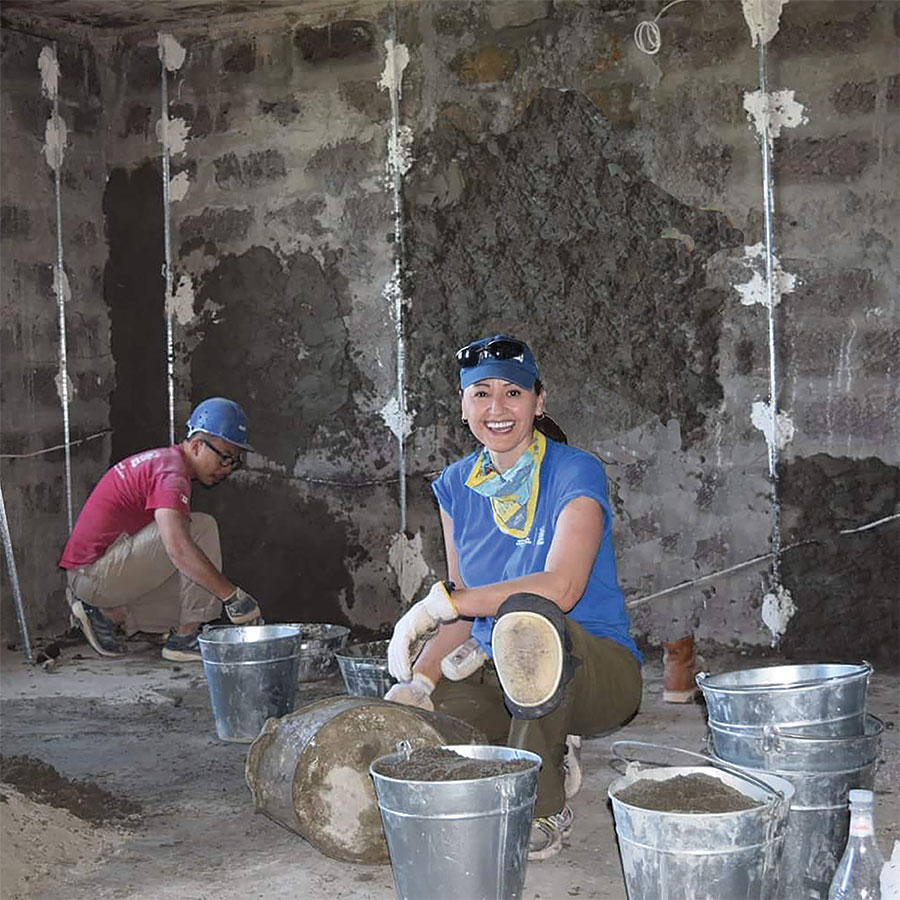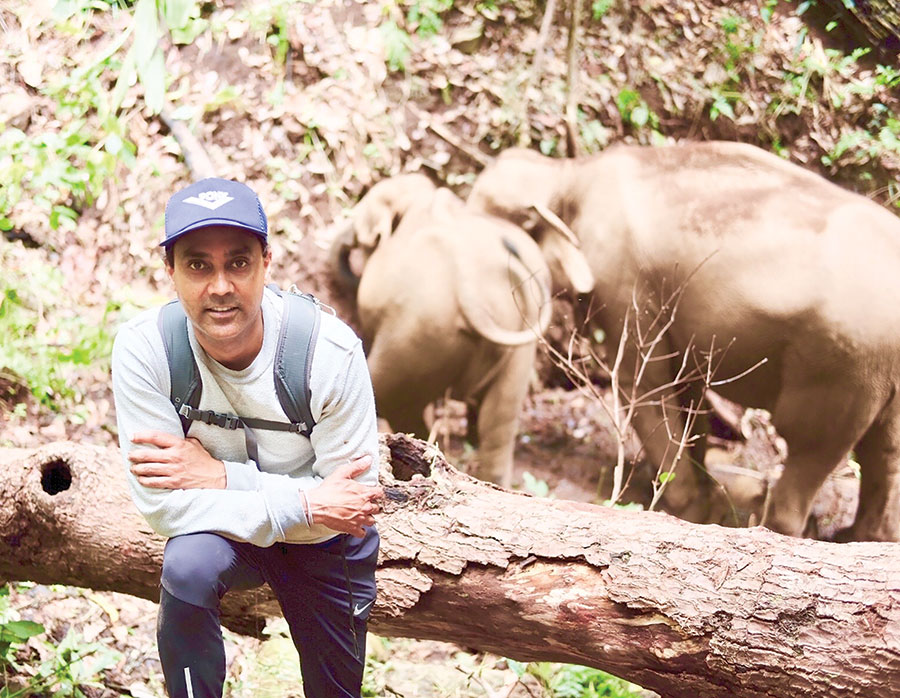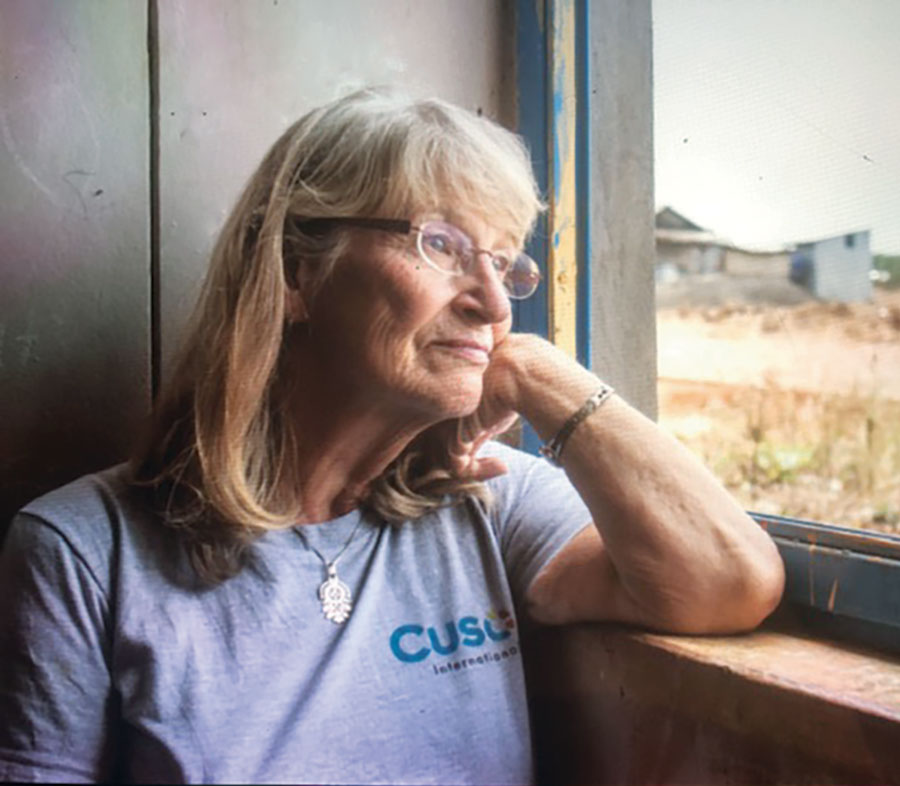Gaining Perspective: 3 Canadians Describe the Life-Changing Experience of Volunteering Abroad

When Mahesh Babooram, 49, decided to volunteer in 2019, he looked for a unique experience in a place he’d never visited. Photo: Courtesy of Mahesh Babooram
Volunteering overseas is as much about helping yourself as doing
good deeds. Just ask these three older recruits.
What’s not to like about giving your time, skills and experience to benefit other people and the planet, while visiting another country? Volunteering overseas is picking up again in the wake of the pandemic, according to Andrea Fiorito, Cuso International’s manager of volunteering for development. “We are recruiting normally now,” says Fiorito, whose Ottawa-based charity works with local partners to improve economic opportunities, with a focus on empowering women and girls and advancing their equality. The goal is to send 80 Canadian volunteers overseas by the end the fiscal year, compared with 150 in 2019. During the pandemic, Cuso focused on mobilizing volunteers who were already abroad.
Since it launched in 1961, Cuso has mobilized more than 14,000 volunteers for some 18,000 placements in 100-plus countries. Retirees are one of its three major volunteer groups, along with mid-career professionals and recent university grads. “We have a lot of people who are retired. They have the experience we need. They want to do something interesting and exciting in their lives, perhaps in another country,” says Fiorito.
The WE Charity scandal prompted Canadians to look more closely at where their donations were going. The international development organization, founded in 1995 by brothers Craig and Marc Kielburger, made headlines during the pandemic over a multi-million dollar contract it received from the federal government for a student grant program. WE was also accused of misleading donors — a charge it denies — and criticized for a lack of transparency around the relationship between its non-profit charities and its for-profit ME to WE social enterprises. WE Charity once controlled $40 million worth of property in Toronto.
So Canadians might be skeptical about philanthropic groups. How can would-be overseas volunteers find a reputable operator? “Do your research to ensure that the organization works with local partners and develops their positions based on the partners’ needs,” Fiorito advises. “It’s also important to see what type of training and support the organization provides.”
Fiorito recommends talking to volunteers, too, so we connected with three Canadians who have shipped out for long and short assignments.
The motive: A former medical social worker who earned four degrees while working full time, Sally Hughes, 74, began volunteering abroad when she retired. Hughes, whose PhD dissertation examined how older adults find personal meaning by volunteering in developing countries, says big life changes prompt people to seek new purpose. She can relate, having suffered a separation and a life-threatening car accident. “There’s a need to emerge from that and re-identify who you are,” says Hughes, who lives in Victoria. “Older people are a huge untapped market for volunteers.”
The experience: Besides volunteering in Malawi before her Cuso days, Hughes has represented the charity in Ethiopia and Laos, and plans to go to Tanzania this fall. In western Ethiopia in 2018, she helped develop a research initiative at Assosa University to explore gender-based violence and worked in a refugee camp near the Sudanese border.
The takeaway: Using her skills brings a sense of satisfaction and well-being, Hughes explains. Thanks to placements that typically last six to nine months, she’s become healthier, too, given frequent walks and a plant-based diet in Ethiopia, where meat is scarce. And she feels valued, noting ageism is less common in the developing world.
The cost: Volunteers contribute or fundraise $2,000.
Pro tips: Prospective volunteers who worry about their safety should know that they’re never alone. “People are so happy to have you that they’ll go over backwards to help you,” Hughes says. Oh, and check your entitlement. “I became very much aware, during my time back at school, of my whiteness and my privilege … you’re never the same as them. Many volunteers feel instantly that they’re adopted into this family and they’re the same. But you’re not. You have so many more privileges.”
Building a Global Village

Organization: Habitat for Humanity Canada
The motive: Johanna Fernandez, 52, began volunteering with Habitat for Humanity in 2008, after her eldest son took a school trip abroad with the housing-focused non-profit. Her first placement was in Tajikistan as part of Global Village, an international program that brings people together to renovate and build homes. “I think it’s just human nature,” the retired entrepreneur from Mississauga, Ont., says of the urge to volunteer. “It’s instinctive to help each other.”
The experience: Fernandez became a Global Village team leader in 2010. So far, she’s done 32 trips in that role, among them a 2018 Big Build in southeastern Vietnam’s Dong Thap province, where teams from around the globe helped 26 families. “You have hundreds of [people] volunteering for two weeks,” says Fernandez, who is eagerly awaiting the relaunch of Global Village after it was suspended in 2020 due to the pandemic. “It’s just a massive involvement in the community.”
The takeaway: “Volunteering is definitely something where you get more than you give,” says Fernandez. “The enrichment to your life is incalculable.” That includes the humility you gain from working and connecting with families who make the most of difficult circumstances. “You just come back in awe of these people.”
The cost: A $2,950 donation covered meals, accommodation, local transport and medical insurance. Volunteers, who arrange and pay for airfare separately, get charitable tax receipts.
Pro tips: “Be adventurous,” Fernandez tells newbies. “Don’t be afraid to be vulnerable,” she adds, describing travel to a new country as “a beautiful experience when you do it with a group of like-minded people.” And remember: Every small act makes a difference. “If I do one positive thing and somebody else does another positive thing, it adds up.”
Cultural Immersion

Organization: Global Vision International (GVI) Canada
The motive: When Mahesh Babooram, 49, decided to volunteer in 2019, he looked for a unique experience in a place he’d never visited. “I wanted to go away somewhere by myself, but I wanted to do something productive with the time, rather than just lying on the beach and sipping margaritas all day,” says the strategy and innovation officer with Toronto-based mform Construction Group.
The experience: Babooram joined a team of fellow volunteers for a week-long placement and homestay in northern Thailand through the conservation and community development organization, which was working with members of the Karen tribe to study the behaviour of elephants in the mountain forests near the village of Huay Pakoot. “This trip check marked all those boxes, especially the ability to live with a family in Thailand for a week and learn the customs, the traditions.”
The takeaway: “The connection between man and nature, and the ability to live [frugally],” Babooram says. Going on a group tour made him feel safe and removed the pressure of taking a solo trip.
The cost: $3,595, which covered food, accommodation and transport, excluding flights. Discounts and scholarships are available, and the longer a participant stays, the lower the cost per day.
Pro tips: For anyone considering a similar excursion, Babooram recommends arriving early to adjust to the climate and cuisine. He also suggests learning about your host family in advance, partly to choose a thank you gift that meets their needs. Babooram, who plans to volunteer overseas again, likes the idea of reconnecting with team members. “It would be really neat to meet up a year later to talk.”
Correction: WE Charity once controlled $40-million worth of property in Toronto. A previous version of this story incorrectly stated ME to WE Assets Holdings once controlled $40-million of property in Toronto. We regret the error.
A version of this article appeared in the Oct/Nov 2022 issue with the headline “All Aboard,” pg. 76
RELATED:
How Small Acts of Kindness Can Make You Happier and Healthier
